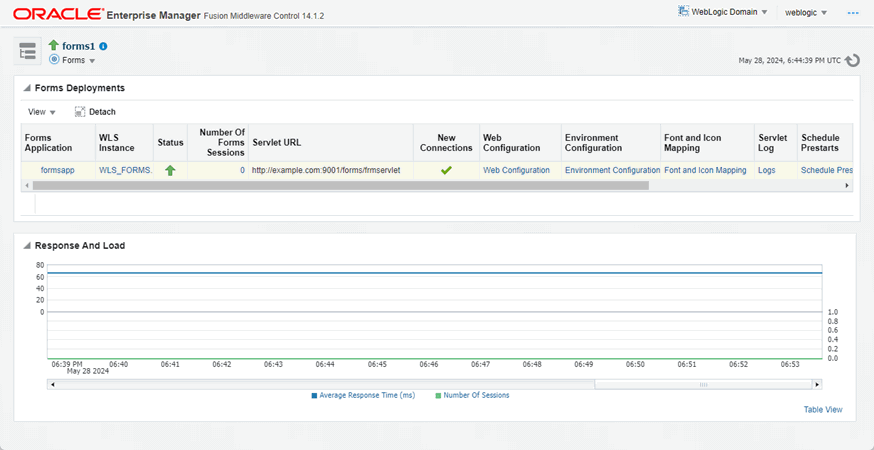Fusion Middleware Control and Oracle Forms
Fusion Middleware Control is a Web-based tool that is launched from a web browser.
The default URL for Fusion Middleware Control is http://<example.com>:7001/em
Use the Web-based Oracle Fusion Middleware Control to:
-
Monitor metrics for a Forms Services instance, as described in Monitoring Forms Services Instances.
-
Manage user sessions, as described in Managing User Sessions
-
Configure parameters for a Forms Services instance, as described in Configure Parameters with Fusion Middleware Control.
-
Configure Forms Trace and monitor trace metrics, as described in Enable and Configure Forms Trace and Taking Advantage of Oracle Diagnostics and Logging Tools.
-
Configure multiple environment files, as described in Managing Environment Variables.
-
Configure and use JVM pooling, as described in Managing JVM Pooling from Fusion Middleware Control.
Accessing Forms Services with Fusion Middleware Control
To perform most management tasks for a Forms instance using Fusion Middleware Control, start by navigating to the Forms home page in Fusion Middleware Control.
For introductory information about using Fusion Middleware Control, see Overview of Oracle Fusion Middleware Administration Tools in the Administering Oracle Fusion Middleware guide.
To navigate to the Forms Home page in Fusion Middleware Control:
- Navigate to the home page for the Fusion Middleware Control that contains the Forms instance you want to manage.
- Expand the navigation side panel and expand the Forms node. Click the link for the Forms instance you want to access.
- The Forms Home page provides information on the Forms applications that are deployed on the Forms instance.
The information displayed on the Forms Home page, is describes in Table -13.
Table -13 Forms Deployment Fields
| Field | Description |
|---|---|
| Forms Application | Lists the names of the Forms applications that are deployed on the Oracle WebLogic Server instance. Click the name to view the Forms application home page. |
| WLS Instance | Name of Oracle WebLogic Server instance where the application is deployed. |
| Status | Indicates the status of the forms application. A green up arrow indicates the application is running. A red down arrow indicates the application is not started. |
| Number of Forms Sessions | Displays the number of active forms sessions. |
| Servlet URL | Displays the URL for the Forms servlet. |
| New Connections | Indicates whether new connections are enabled or not. |
| Web Configuration | Link to the Web Configuration page. |
| Environment Configuration | Link to the Environment Configuration page. |
| Fonts and Icon Mapping | Link to the Fonts and Icon Mapping page. |
| Servlet Logs | Link to the Servlet Logs. |
| Prestart Scheduling | Link to the Prestart scheduling page. |
| Advanced | Link to the Advanced Configuration page. |
To access the Forms Menu in Fusion Middleware Control:
- Navigate to the Forms home page in Fusion Middleware Control.
- Click Forms on the top left. This displays the Forms Menu. Table -14 lists the Menu Selections that are available in the Forms Menu.
Table -14 Forms Menu Options
| Select | To Display |
|---|---|
| Home | Forms Home page. This page displays a list of the Forms deployments and their details. This page also displays the Response and Load statistics and a set of useful links in the Resource Center. |
| Monitoring - Performance Summary | Performance Summary page. This page displays a set of default performance charts that show the values of specific performance metrics, see Monitoring Oracle Fusion Middleware in Administering Oracle Fusion Middleware. |
| Monitoring - Servlet Log | Log Messages page. Oracle Fusion Middleware components generate log files containing messages that record all types of events. |
| JVM Controllers | JVM Controllers page. This page manages the JVM controller for the Forms instance. |
| Schedule Prestart | Prestart scheduling page. This page manages Forms prestart scheduling. |
| User Sessions | User Sessions page. This page monitors and traces User Sessions within a Forms instance. |
| Web Configuration | Web Configuration page. This page configures deployment of Forms applications and manage configuration sections and parameters in formsweb.cfg.
|
| Trace Configuration | Trace Configuration page. This page manages the settings used for tracing of user sessions. |
| JVM Configuration | JVM Configuration page. This page modifies the JVM controllers that can be subsequently spawned for the Forms instance. |
| Environment Configuration | Environment Configuration page. This page manages environment variables that define environment settings for Forms run time. |
| Advanced Configuration | Advanced Configuration page. This page allows you to edit a Forms configuration or template file and apply the settings. |
| Fonts and Icons Mapping | Fonts and Icons Mapping page. This page helps to change, add, or delete parameters in the Registry.dat file. |
| Security |
Displays information about the following:
|
| General Information | Displays information about the Target Name, Version, Oracle Home, and Host. |
Note:
For the pages that include a Help icon, click the Help icon to access the page-level help. The page-level help describes each element in the page.